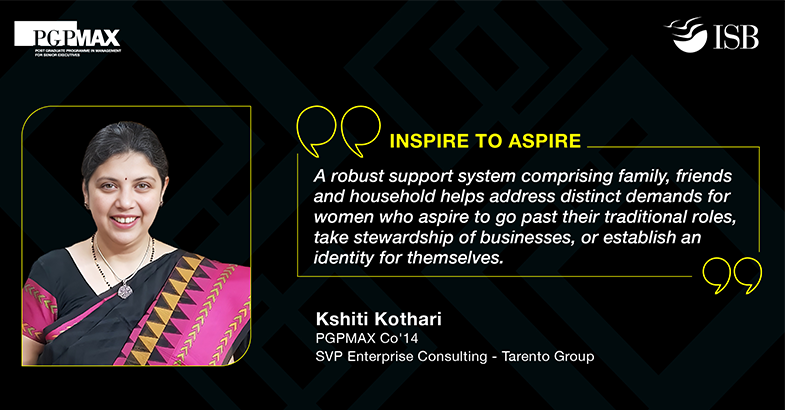
Overcoming the Barriers of Self-confidence and Building Strong Support Systems
When Kshiti Kothari, PGPMAXCo’14, enrolled into engineering, she was allotted Mechanical Engineering, over her preferred Electronics Engineering (she, however, got back Electronics in the third semester). Girls in Mechanical engineering, dominated by boys, were an uncommon sight those days. With just another girl to give her company, it was a challenge of sorts. With the challenge came the opportunity for Kshiti to establish her identity. Her already inherent ability to network and connect easily with people helped her grow in confidence. She felt no different from the boys and believed she too could do all that they could. Strengthened by her confidence, she felt more comfortable and made several friends.
Kshiti asserts on the significance of self-confidence and a robust support system as key to women in pursuing higher education and a rewarding career.
Boosting Self Confidence
Women in professional space come with certain constraints because of which the numbers, high at entry level, decline at higher levels. A reason for the high turnover is a shift in their focus after marriage. Counselling them at every phase to manage their career, therefore, can help their retention at every level. Another mindset that often impedes their ascent is the way women treat their careers. For most, their vocation is just a job, in contrast to their male counterparts who are more aggressively focused and decisive of where they are going.
Another challenge is that women most often assume that quietly doing a great job will fetch them the rewards. They don’t promote themselves, advertise their work, or build relationships. Kshiti has run several initiatives of women enhancement and feels that awareness, self-confidence, and mentoring in these areas can strengthen women and can deliver desirable outcomes.
Most women hesitate in seeking support for apprehensions of appearing weak and vulnerable. Additionally, they doubt if they would be responded to appropriately. A way around these conundrums is to be bold in seeking support; cite a valid reason and no one will hesitate in extending support. Whether it’s about challenges at work or facility required, women don’t ask because they are not informed.
Establishing Support Systems
The significance of a good support system in personal life should not be underestimated and the onus to establish it lies upon women. At every stage, the support required would be different, however.
A robust support system comprising family, friends and household helps address distinct demands for women who aspire to go past their traditional roles, take stewardship of businesses or establish an identity for themselves. Women working at home build networks and make certain their support systems are in place, but the same’s not true for working women who are equipped with good education and are financially well off.
Women typically bear a disproportionate amount of responsibility for home and family and it’s no surprise they develop extraordinary multitasking capabilities. If they can do so much, they can very ably put a support system in place too. There have been an instance of a lady student bearing a child while doing her PGPMAX and her family made sure there was no impediment in her attending her classes.
The immense support Kshiti had from her family helped her come well prepared for the classes, and that enabled her to elicit maximum value out of the sessions. The stint at ISB also played a major part in building upon her role in her profession. PGPMAX has been a game changer, has helped her structure her moves and has ensured she did not stagnate in her career. She has used all her learning in every role she took after the programme.
Kshiti’s message to the batch of PGPMAX women is that they must see themselves as privileged and must make an impact by taking senior roles. Each woman should develop confidence and build a support system that would enable them to coast through their PGPMAX programme with flying colours.

